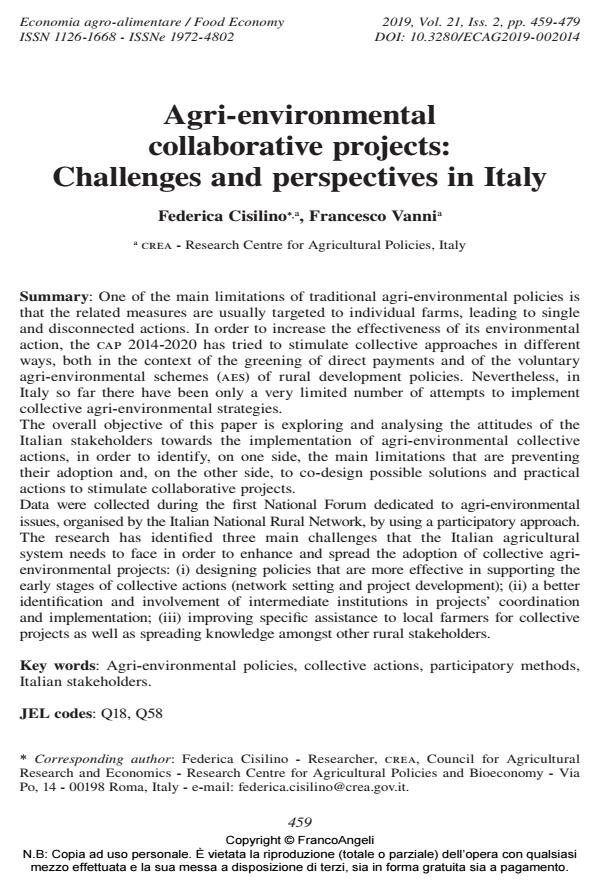Agri-environmental collaborative projects: Challenges and perspectives in Italy
Titolo Rivista ECONOMIA AGRO-ALIMENTARE
Autori/Curatori Federica Cisilino, Francesco Vanni
Anno di pubblicazione 2019 Fascicolo 2019/2
Lingua Inglese Numero pagine 21 P. 459-479 Dimensione file 160 KB
DOI 10.3280/ECAG2019-002014
Il DOI è il codice a barre della proprietà intellettuale: per saperne di più
clicca qui
Qui sotto puoi vedere in anteprima la prima pagina di questo articolo.
Se questo articolo ti interessa, lo puoi acquistare (e scaricare in formato pdf) seguendo le facili indicazioni per acquistare il download credit. Acquista Download Credits per scaricare questo Articolo in formato PDF

FrancoAngeli è membro della Publishers International Linking Association, Inc (PILA), associazione indipendente e non profit per facilitare (attraverso i servizi tecnologici implementati da CrossRef.org) l’accesso degli studiosi ai contenuti digitali nelle pubblicazioni professionali e scientifiche.
One of the main limitations of traditional agri-environmental policies is that the related measures are usually targeted to individual farms, leading to single and disconnected actions. In order to increase the effectiveness of its environmental action, the cap 2014-2020 has tried to stimulate collective approaches in different ways, both in the context of the greening of direct payments and of the voluntary agri-environmental schemes (aes) of rural development policies. Nevertheless, in Italy so far there have been only a very limited number of attempts to implement collective agri-environmental strategies. The overall objective of this paper is exploring and analysing the attitudes of the Italian stakeholders towards the implementation of agri-environmental collective actions, in order to identify, on one side, the main limitations that are preventing their adoption and, on the other side, to co-design possible solutions and practical actions to stimulate collaborative projects. Data were collected during the first National Forum dedicated to agri-environmental issues, organised by the Italian National Rural Network, by using a participatory approach. The research has identified three main challenges that the Italian agricultural system needs to face in order to enhance and spread the adoption of collective agrienvironmental projects: (i) designing policies that are more effective in supporting the early stages of collective actions (network setting and project development); (ii) a better identification and involvement of intermediate institutions in projects’ coordination and implementation; (iii) improving specific assistance to local farmers for collective projects as well as spreading knowledge amongst other rural stakeholders.
Parole chiave:Agri-environmental policies, collective actions, participatory methods, Italian stakeholders.
Jel codes:Q18, Q58
- Co-design approaches in land use related sustainability science – A systematic review Maria Busse, Jana Zscheischler, Felix Zoll, Sebastian Rogga, Rosemarie Siebert, in Land Use Policy 106623/2023 pp.106623
DOI: 10.1016/j.landusepol.2023.106623 - The opportunities and challenges to co-designing policy options for tree health with policy makers, researchers and land managers Bianca Ambrose-Oji, Julie Urquhart, Gabriel Hemery, Gillian Petrokofsky, Liz O’Brien, Glyn D. Jones, Berglind Karlsdóttir, in Land Use Policy 106974/2024 pp.106974
DOI: 10.1016/j.landusepol.2023.106974 - Sustainability Goals and Firm Behaviours: A Multi-Criteria Approach on Italian Agro-Food Sector Lucia Briamonte, Raffaella Pergamo, Brunella Arru, Roberto Furesi, Pietro Pulina, Fabio A. Madau, in Sustainability /2021 pp.5589
DOI: 10.3390/su13105589 - Farewell Editorial for the Issue 3/2024 Maurizio Canavari, Sedef Akgüngör, Valeria Borsellino, Alessio Cavicchi, Catherine Chan, Alessio Ishizaka, Simona Naspetti, Søren Marcus Pedersen, Stefanella Stranieri, in Economia agro-alimentare 3/2025 pp.7
DOI: 10.3280/ecag2024oa19047 - The economic and environmental sustainability dimensions of agriculture: a trade-off analysis of Italian farms Brunella Arru, Federica Cisilino, Paola Sau, Roberto Furesi, Pietro Pulina, Fabio A. Madau, in Frontiers in Sustainable Food Systems 1474903/2024
DOI: 10.3389/fsufs.2024.1474903 - Redefining co-design for social-ecological research and practice: A systematic literature review Mairéad O’Donnell, Marcus Collier, Melissa Pineda-Pinto, Clair Cooper, Fiona Nulty, Natalia Rodriguez Castañeda, in Environmental Science & Policy 103998/2025 pp.103998
DOI: 10.1016/j.envsci.2025.103998 - ‘We’re Farmers Not Foresters’: Farmers’ Decision-Making and Behaviours towards Managing Trees for Pests and Diseases Bianca Ambrose-Oji, Alice Goodenough, Julie Urquhart, Clare Hall, Berglind Karlsdóttir, in Forests /2022 pp.1030
DOI: 10.3390/f13071030
Federica Cisilino, Francesco Vanni, Agri-environmental collaborative projects: Challenges and perspectives in Italy in "ECONOMIA AGRO-ALIMENTARE" 2/2019, pp 459-479, DOI: 10.3280/ECAG2019-002014